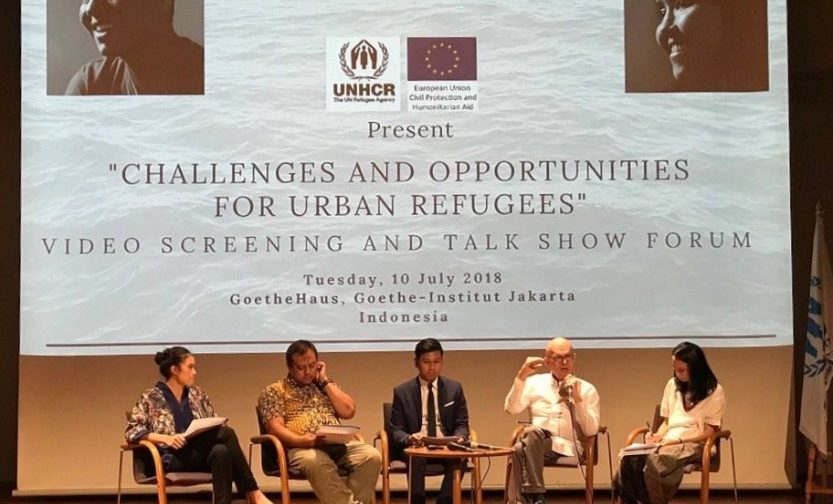Through a short documentary, Liaqat and his family told their compelling story of refugees’ hopes and dreams. The documentary which was produced by UNHCR with funds generously contributed by the European Union (the European Commission’s Department for Humanitarian Aid and Civil Protection/ ECHO), highlights the challenges faced by urban refugees in Jakarta, Indonesia, as well as in Kuala Lumpur, Malaysia, and Bangkok, Thailand.
UNHCR organized the screening of the documentary on 10 July at the Goethe-Institute Jakarta, followed by a discussion on the challenges and opportunities faced by urban refugees, as well as detention policies in the region.
In the video, Liaqat and her sister Rahila talked about their family’s lives inside the detention centre. Thanks to a mechanism established by the Government of Indonesia, Liaqat’s family was allowed to be transferred from an immigration detention centre to a community shelter in Jakarta. Liaqat and the rest of his family were given special recognition at the event for sharing their stories.
UNHCR organized the screening of the documentary on 10 July at the Goethe-Institute Jakarta, followed by a discussion on challenges and opportunities faced by urban refugees, including on detention policies in the region.
In the video, Liaqat and her sister Rahila talked about their family’s lives inside and outside the detention. Thanks to a mechanism established by the Government of Indonesia, Liaqat’s family was allowed to be transferred from immigration detention centre to a community shelter in Jakarta. Liaqat and the rest of his family were given special recognition at the event for sharing their stories.
Numerous studies have reported that detention has adverse effects on children’s health and development. Being detained can undermine children’s ability to enjoy a range of human rights, including the right to an education, the right to play and the right to expand their opportunities.
“We all have hopes and dreams. Refugees too. Dreams to be an artist, an astronaut or a humanitarian worker. I know many refugees who have skills, talents and knowledge to share with others – they are bright, eager and capable. All they need are the opportunities – a mentor, perhaps to help them achieve their dreams and not give up their hopes,” said Thomas Vargas, UNHCR Representatives in Indonesia.
“Refugees have hopes and dreams; they also have rights. We pay tribute to the indispensable role played by UNHCR, together with hosts countries and NGOs, in enabling refugees to exercise their rights to safety and protection, and in raising public awareness on both the challenges faced by refugees and the contribution they can bring to their host countries. The EU – and its humanitarian Office, ECHO – is therefore very happy to support the documentary film screened today,” said Charles-Michel Geurts, Deputy Head of European Union Delegation to Indonesia.

@UNHCR/T. Vargas
The event marks UNHCR’s ongoing work to promote alternatives to detention of children and their families. Speakers from civil society and the European Commission’s Department for Humanitarian Aid and Civil Protection (ECHO) share their experience in assisting refugees and why it is important to get involved. Heru Susetyo, a human rights expert from the University of Indonesia’s Department of Law Society and Development, reiterated that according to the Presidential Regulation number 125 of Handling of Refugees, immigration detention centers are established to accommodate foreign nationals who violate Indonesia’s immigration laws, not particularly for refugees. Meanwhile, Roman Majcher, Humanitarian Expert from ECHO highlighted the importance of civil society’s active engagement in raising awareness on refugee issues, which may drive policy makers to strengthen protection for refugees.
Diovio Alfath founder of NGO Sandiya Institute, which runs several projects to help refugees through Sunrise Learning Center and Katrina Wardhana, founder of a refugee empowerment program and social entrepreneurship Art for Refuge, shared their experience in working to empower refugees and showed how empowerment is important to build their confidence as refugees’ prepare for their future.
UNHCR continues to work with the Government of Indonesia and other partners in the country, including the International Organization for Migration, Church World Service and Tzu Chi Foundation, to establish shelters for more refugees to be freed from detention.
As of May 2018, Indonesia hosts some 13,900 refugees from 49 countries around the world. Out of this total population, 17% of the refugees, including some 700 children (21% of the total population of refugee children) are kept in detention facilities across Indonesia, waiting to be transferred. This number however reflects a significant decrease in the number of refugees in detention from previous years. In early 2015, some 38% of registered refugees in Indonesia were in detention centres.
“Working together with the Government of Indonesia, partners, and stakeholders, UNHCR hopes that more refugees can be released from detention. In addition, UNHCR will continue to advocate expanding alternative options to include others such as regular reporting and guarantor schemes,” said UNHCR Indonesia Representative Thomas Vargas.
Share on Facebook Share on Twitter